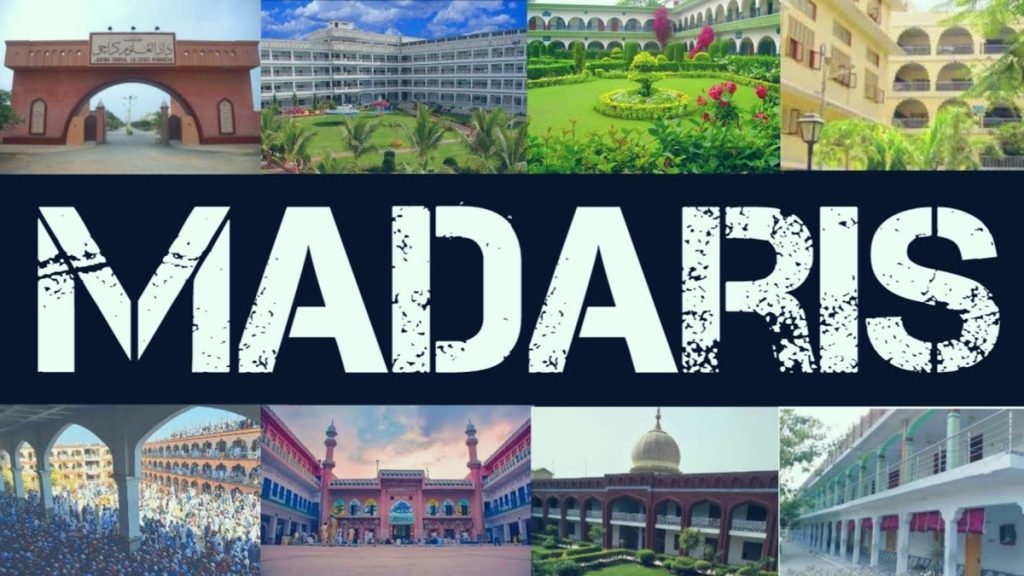In Pakistan, the madaris are based on sect, and every sect has its own madrassa network that is controlled by a board or Wafaq. Every board has its own system of education and they hold annual exams and distribute certificates among students. There are five madrassa boards or wafaqs in Pakistan, and they are also members of Ittehad Tanzeemat Madaaris Deenia (ITMD), an umbrella organization of madaris, which was established in 2003. They are;
- Wafaq ul-Madaaris al-Arabia (Deobandi)
- Tanzeem ul-Madaaris (Barelvi)
- Wafaq ul-Madaaris al-Salafia. (Ahl-e-Hadith)
- Wafaq ul-Madaaris al-Shia (Shia)
- Rabita ul-Madaaris al-Islamia (Jama’at-e-Islami)
Among the five above-mentioned boards, four of them are classified on the basis of sects; Deobandi, Barelvi, Shia or Ahl-e-Hadith, and a fifth board that is affiliated to Jama’at-e-Islami does not adhere to any specific sect. There are two primary sects in Pakistan, the Sunnis and Shias. The Shias makes up about 15% of the Pakistani Muslims. The Pakistani Sunnis are followers of the Hanafi school of thought. Among the Sunnis, the majority are Barelvi, a generally moderate group who seek to be inclusive of local rituals and customs. The Deobandi school of thought (originating in the Indian town of Deoband, near Delhi), seek to purify Islam by rejecting “un-Islamic” accretions to the faith from culture and custom. The Ahl-e-Hadith (followers of the way of the Prophet) have a similar emphasis on “purifying” the faith, but they do not follow any fiqh (religious jurisprudence), as opposed to the Hanafi fiqh. The details of the abovementioned boards with particular reference to their sect are as follows:
1. Wafaq ul-Madaris al-Arabia (Deobandi)
Central board of Sunni Deobandi institutions; established at Mulltan in 1960.
Although within the Sunni sect, Barelvis are greater in number, Deobandis have more religious seminaries in Pakistan because they are more organized in the realm of religious activism. The registered number of Deobandi madaris is about 16,800 affiliated with Wafaq ul- Madaaris al-Arabia. Hifz, tajweed and dars-e-nizami madaris are also included in the total number. Jamia Ashrafia Lahore and Dar ul-Uloom Korangi Karachi are distinguished within Deobandi madrassas because they are operating independently, and their degrees and certificates were approved by the government during the Zia-ul-Haq regime. However, their students also appear in the exam board of Wafaq ul-Madaaris al-Arabia.
2. Tanzeem ul-Madaris (Barelvi)
Central board of Sunni Barelvi institutions; established at Lahore in 1960.
The total number of registered madaris affiliated with Tanzeem ul-Madaaris is about 8,000, which is less than half of the total number of Deobandi madaris. The Barelvi sect follows the creed of Sufism that prevailed in the sub-continent. Within the network of Barelvi madrassas, Dar-ul-Uloom Muhammadia Ghosia Bhera, district Sargodha, Punjab which has more than four hundred branches, and Minhaj-ul-Quran, which has schools and colleges equipped with modern education, make a distinction as they are not affiliated with Tanzeem ul-Madaaris and have separate education and examination systems.
3. Wafaq ul-Madaris al-Salafia. (Ahl-e-Hadith)
This board was established by the Ahl-i Hadith at Faisalabad in 1955.
The other Sunni group is the Ahl-e-Hadith, a small minority, which holds 1,400 registered madaris affiliated with Wafaq ul-Madaaris al-Salafia in Pakistan. The Pakistanis often refer to this group as the Wahhabis and/or Salafis, as their teachings are close to that of Abdul Wahhab. They completely reject all schools of thoughts including the Hanafi. The madaris of the controversial Jama’at-ud-Dawa are also registered in Wafaq-ul-Madaaris al-Salafia. Jamia Salafia Faisalabad, founded by Hakeem Abdur Raheem Ashraf is the only madrasa within the Salafi school of thought which is independent with regards to examinations, and distributes degrees with the approval of the government.
4. Wafaq ul-Madaris al-Shia (Shia)
This board of Shia institutions was established in 1959 and has its centre in Lahore. Shia madrassas teach fiqh Jafariya named after Imam Jafer Sadiq, while other madrassas in Pakistan teach fiqh Hanafia.
Although Shias are in minority in Pakistan, they have a considerable number of Madaris; about 413 madaris are registered under Wafaq ul-Madaaris al-Shia. There is no distinct seminary in the Shia sect of Pakistan that has authority to issue a degree or hold examinations independently.
5. Rabita ul-Madaris al-Islamia (Jama’at-e-Islami)
This board was established by the Jamaat-i-Islamiat Lahore in 1983, and recognizes the madrassas of all Islamic thought. They teach more modern subjects. The Jama’at-e-Islami, founded by the prominent Islamic thinker Ab’ul ala Mawdudi, is a revivalist and religio-political movement that considers itself as the “vanguard” of the Islamic revolution in Pakistan. It has an independent orientation, with no affiliation to any sect. There are about 1,000 registered madaris affiliated with Jama’at-e-Islami’s madrassa network Rab-ita ul Madaaris.
OTHER RELATED POSTS
